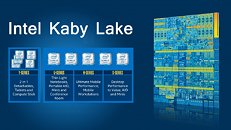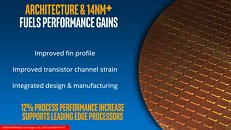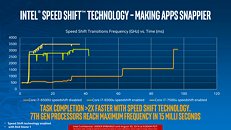Monday, October 31st 2016

Intel Kaby Lake Desktop Processors Specifications Detailed In Official Documents
News and specifications about Intel's upcoming Kaby Lake-based desktop CPUs are thin, but a recent leak has made it possible to discern at least some details, due to an Intel product change notification (PCN) document.
A PCN is a document issued by a manufacturer to inform customers about a change to a mass-produced product or its manufacturing process. In this PCN, Intel details a new factory in Vietnam which will work in order to "ensure a continuous supply of the Select Intel Xeon Processor E3-1205, Intel Core i5-7400 Processor, Intel Core i5-7400T Processor, Intel Core i5-7500 Processor, Intel Core i5-7500T Processor, Intel Core i5-7600 Processor, Intel Core i5-7600K Processor, Intel Core i5-7600T Processor, Intel Core i7-7700 Processor, Intel Core i7-7700T Processor and Intel Core i7-7700K Processor products".According to the document, Intel is readying a first release wave of at least 11 quad-core processors. The chips keep the usual Intel nomenclature of cores and Hyper-Threading scaling from i3 (2 cores, 4 threads) through i5 (4 cores, 4 threads) and i7 (4 cores, eight threads) models. As has been the case in the past, Intel will have available high-performance K variants (i.e., with an unlocked multiplier and 95W TDP), T variants (low-power, 35 W TDP) and standard, 65 W versions of their Kaby Lake processors. THE PCN also "details" what looks like a Xeon part, E3-1205v6, though not much about it is known at this time, with the exception of its 3.0 GHz frequency.Of these 11 processors, three will be Core i7 models, filling TDP levels of 95, 65 and 35 W (i7-7700K, with base frequency of 4.2 GHz and 95 W TDP; i7-7700, with reduced clockspeed of 3.6 GHz and 65 W TDP, and a a low-power, 2.9 GHz i7-7700T). Another seven CPUs will fit in the i5 bracket (from the top-of-the-line i5-7600K, an unlocked-multiplier CPU operating at 3.8 GHz and 95W TDP through to the lowest-performing processor, the 35 W, 2.4 GHz i5-7400T.
Architecture-wise, not much of a difference is expected between the upcoming Kaby Lake family of processors compared to their Skylake predecessors, barring some eventual refinements here and there (if you choose to count Intel's Speed Shift v2 technology here, feel free to do so). The same is true for their manufacturing process, with Intel's 14nm+ basically enabling a bump in frequencies for all Kaby Lake processors' stock clocks when compared to their Skylake predecessors ranging between a moderate 300 Mhz (i5-7600K against the i5-6600K, for instance) and a measly 100 MHz increase (i7-7700T against its 17-6700T counterpart).It's likely that most performance improvements with Kaby Lake will stem from their increased frequency, as well as the ability to more quickly change between frequency states, but to how much of an improvement that will bring remains to be seen. It may be that the refined 14nm+ manufacturing process that Intel is leveraging here will allow for increased overclocking potential - and then again, those eventual gains may already be reflected in the base frequency bump Intel has applied to the Kaby Lake family.
A PCN is a document issued by a manufacturer to inform customers about a change to a mass-produced product or its manufacturing process. In this PCN, Intel details a new factory in Vietnam which will work in order to "ensure a continuous supply of the Select Intel Xeon Processor E3-1205, Intel Core i5-7400 Processor, Intel Core i5-7400T Processor, Intel Core i5-7500 Processor, Intel Core i5-7500T Processor, Intel Core i5-7600 Processor, Intel Core i5-7600K Processor, Intel Core i5-7600T Processor, Intel Core i7-7700 Processor, Intel Core i7-7700T Processor and Intel Core i7-7700K Processor products".According to the document, Intel is readying a first release wave of at least 11 quad-core processors. The chips keep the usual Intel nomenclature of cores and Hyper-Threading scaling from i3 (2 cores, 4 threads) through i5 (4 cores, 4 threads) and i7 (4 cores, eight threads) models. As has been the case in the past, Intel will have available high-performance K variants (i.e., with an unlocked multiplier and 95W TDP), T variants (low-power, 35 W TDP) and standard, 65 W versions of their Kaby Lake processors. THE PCN also "details" what looks like a Xeon part, E3-1205v6, though not much about it is known at this time, with the exception of its 3.0 GHz frequency.Of these 11 processors, three will be Core i7 models, filling TDP levels of 95, 65 and 35 W (i7-7700K, with base frequency of 4.2 GHz and 95 W TDP; i7-7700, with reduced clockspeed of 3.6 GHz and 65 W TDP, and a a low-power, 2.9 GHz i7-7700T). Another seven CPUs will fit in the i5 bracket (from the top-of-the-line i5-7600K, an unlocked-multiplier CPU operating at 3.8 GHz and 95W TDP through to the lowest-performing processor, the 35 W, 2.4 GHz i5-7400T.
Architecture-wise, not much of a difference is expected between the upcoming Kaby Lake family of processors compared to their Skylake predecessors, barring some eventual refinements here and there (if you choose to count Intel's Speed Shift v2 technology here, feel free to do so). The same is true for their manufacturing process, with Intel's 14nm+ basically enabling a bump in frequencies for all Kaby Lake processors' stock clocks when compared to their Skylake predecessors ranging between a moderate 300 Mhz (i5-7600K against the i5-6600K, for instance) and a measly 100 MHz increase (i7-7700T against its 17-6700T counterpart).It's likely that most performance improvements with Kaby Lake will stem from their increased frequency, as well as the ability to more quickly change between frequency states, but to how much of an improvement that will bring remains to be seen. It may be that the refined 14nm+ manufacturing process that Intel is leveraging here will allow for increased overclocking potential - and then again, those eventual gains may already be reflected in the base frequency bump Intel has applied to the Kaby Lake family.






34 Comments on Intel Kaby Lake Desktop Processors Specifications Detailed In Official Documents
Might as well ask "might jump under the bus for the rest of us?". May the better, more boring and obvious option win those who want it.
Wallet is waiting for Zen and Vega to drop.
It all does not matter that much in the real world so your analogy is way off.
But the performance gains need to be much further than Haswell or Skylake are for investing in an entire build just to upgrade the CPU.
Since AMD is no competition Intel is satisfied in taking these CPU tick, tock, baby steps, it would be nice to see AMD throw a wrench in Intel gears once more like happened in the past and wake them out of their complacency.
Unfortunately for us history may never repeat itself with AMD waking up Intel.
Reminiscing over the AMD FX57, FX60 days.
*) Intel is claiming ~10% IPC improvement for each iteration, but that figure includes new special features such as AES acceleration, AVX, etc. which is only used in specific applications. I'm instead using "real world IPC", talking about improvements which can help all applications.
But bringing it back to your point; there have been no competition at all for five years, so hopefully Zen will help a little bit. I don't expect Zen to be better in most cases, but I do like the direction of some of the features which could make it better for superscalar workloads.
It appears to me like it will have 6 execution ports, 4 ALU + 2 FPU, and a larger L2 cache. For comparison, SB and newer have 3 execution ports capable of ALU or FPU*. I still expect Intel to have a better prefetcher, and perhaps a better memory controller or core IO. (*With 3 execution ports, SB is still capable of up to 8 floating point operations per cycle, combining add, mul, shuf)
These are assumptions, but unfortunately it seems like most workloads will not favor Zen at this point. But at least this time AMD made a good design choice, unilke Bulldozer. I would expect that Intel will make their next architecture more of a superscalar as well, since it's practically the only way to scale IPC going forward. And they really should, because adding more ALUs is really cheap, I would put 8 of them in a core to push developers to write better code. The prefetchers have so big instruction windows now that they can probably feed more execution ports.
Have you ever wondered why modern CPU performance doesn't seem to scale at all? If you remember the 80s and 90s, the CPUs back then were able to achieve impressive stuff thanks to efficient software. But throughout the 90s developers got used to "scale with MHz", assuming that the performance will continue to double every two years or so, so there were no point in spending time optimizing code. The truth is that ever since Netburst hit the clock frequency wall, all major improvements have been in the direction of superscalar processors, yet almost all software is more bloated than ever. More and more advanced prefetchers help mitigate a little bit, but they can only do so much.
Most software today (with the exception of a few optimized libraries, etc.) are written so inefficient that probably less than 5% of the clock cycles is spent doing any real work. This happens because developers design abstract data models without thinking about the hardware nor the actual problem they are going to solve, so they end up with super-bloated abstracted code. Most design patterns doesn't take into account that modern CPUs are superscalars at all. The end result is code where >80% of CPU cycles is spent on branch mispredictions and cache misses. The remainder is mostly OO overhead and similar.
Is it a valid assumption that Intel is "holding back" on CPU development? The general assumption is that because there isn't an alternative choice for x86 CPUs at the high performance end of the product line Intel isn't "trying".
AMD went back to the beginning with what some say is one of the best CPU designers in the business. If they get to 80% of Intel's top performance does that mean Intel really is trying hard and maybe CPUs don't get way faster each generation forever.
On a more personal level ... I work in Excel all day long. A few years ago I built a PC that was faster than my work PC. That led to a faster work PC. While the improvement was immediate and huge I have learned that if I write a better macro (VBA code) I get bigger performance gains that what a new PC delivered.
It might not be possible for Intel to deliver a CPU that can overcome poorly written code ...
The only reason intel would go back to IPC gains is if AMD delivers a chip that matches a skylake chip in IPC.This mindset is what leads to intel controlling the market, because nobody buys AMD. Same issue in the GPU market. If zen is close to skylake performance, why would anybody pay intel's ludicrous prices?
For me the game I play most is Excel ... a 100% IPC improvement would surely improve my enjoyment!
I am supporting the underdog.
For me, more cores mean fewer servers to do the same task (which, on the cloud, means less money to run it,) so, I have a very different perspective on cores than most people do. I only game occasionally now to be honest. I spend more time doing professional development in my free time than I do playing games.
"AMD has released a new part which doesn't meet our expectations. This is AMD's fault."
but also:
"Intel has released a new part which doesn't meet our expectations. This too is AMD's fault."
Intel can do no wrong in the minds of many.